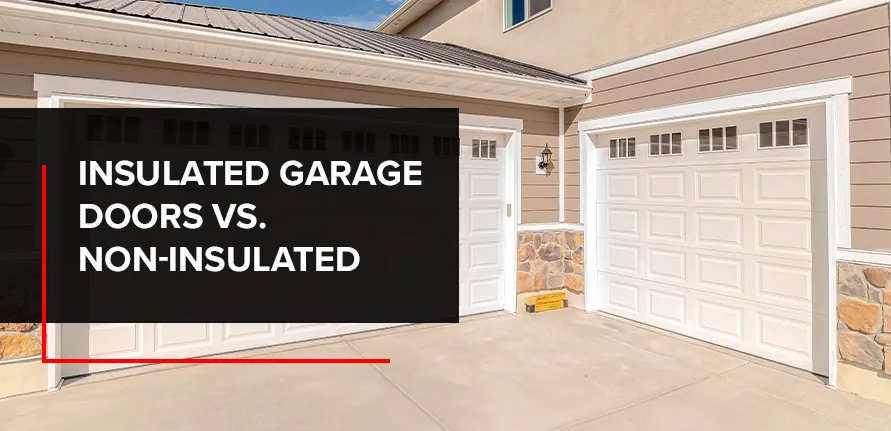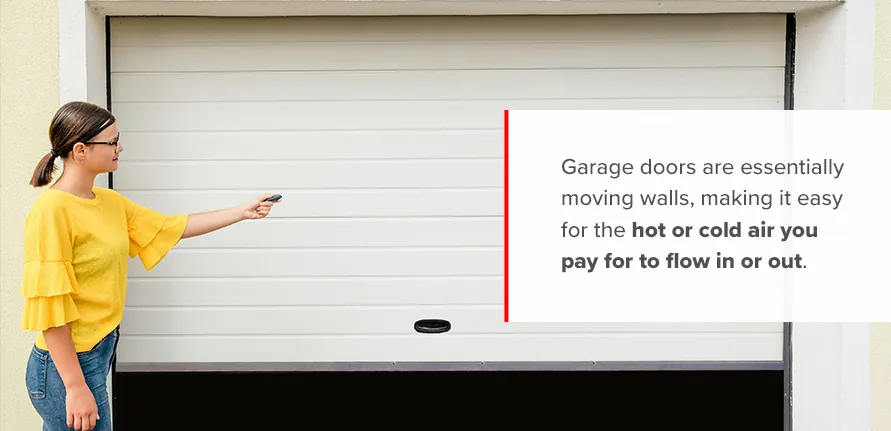If you’re getting rid of your old garage door or picking one out for your new home, you have many decisions to make as you shop for a new overhead door. With so many styles and materials to choose from, you have plenty of options to fall in love with. One crucial choice is whether to invest in an insulated garage door.
WHAT’S THE DIFFERENCE BETWEEN INSULATED AND NON-INSULATED GARAGE DOORS?
Most garage doors offer insulation options, and making the right selection will affect your daily comfort and energy costs. Let’s weigh the pros and cons of insulating an overhead door to see if it’s worth it for you.
- Advantages of Insulated Garage Doors
- Considerations of Insulated Garage Doors
- Advantages of Uninsulated Garage Doors
- Considerations of Uninsulated Garage Doors
UNDERSTANDING A GARAGE DOOR’S R-VALUE OR U-VALUE
Whether you choose an insulated or uninsulated garage door, you will likely see that the door has an R or U-value rating. An R-value measures how well the door insulates against heat flow. A higher R-value indicates better insulation. A U-value measures how much heat can pass through the door by considering the entire assembly. Unlike an R-value, a lower U-value indicates better insulation.
ARE INSULATED GARAGE DOORS WORTH IT?
The difference between insulated and uninsulated garage doors is a thick foam layer. The foam allows the garage to retain heat in the winter and keep cool air inside during the summer.
Here are a few reasons to consider insulating a garage door:
1. THEY MAY RAISE YOUR HOME’S VALUE
Garage doors are a functional and stylish home improvement, making them an excellent way to increase your home’s value through benefits like:
- Boosting curb appeal
- Increasing energy efficiency
- Adding an attractive home element
2. THEY CAN HELP REDUCE YOUR ENERGY BILLS
Garage doors are essentially moving walls, making it easy for the hot or cold air you pay for to flow in or out. Insulated overhead doors make it harder for the air to escape, preventing your energy bill from skyrocketing to keep your home at a desired temperature.
An increase in energy efficiency means your garage will be more comfortable. If your garage is a working or living space, if your garage is a working or living space, you will invest fewer resources in heating or cooling. A more comfortable garage also means benefits like faster snow melt when you pull in your car and a cooler vehicle in the summer.
3. THEY HAVE A LOWER NOISE LEVEL
One of the biggest insulated garage door benefits is that they operate more quietly. The insulation acts as a soundwave absorber, making opening and closing the door less noticeable. This means you can have a garage share a wall with your home or have a bedroom above it without causing any major disruptions.
5. THEY ARE MORE DURABLE
Insulated garage doors have more material backing them, making them thicker and more durable. Greater durability also means your overhead door may last longer, as it can withstand daily wear and tear. Since an insulated garage door keeps your entire garage warmer, it will prevent the springs and other accessories from freezing, resulting in less of a need for garage door opener repair.
6. THEY OFFER BETTER OVERALL PROTECTION
Installing an insulated garage door allows you to protect a variety of temperature-sensitive materials in your garage. For example, an insulated overhead door can prevent paint and fertilizers from freezing or your car battery from dying.
CONSIDERATIONS OF INSULATED GARAGE DOORS
While insulated garage doors provide many benefits, they’re not for everyone. Some people don’t choose insulated doors because of downsides like these below:
1. HIGHER COSTS
One of the main considerations for insulated garage doors is their cost. Most insulated overhead doors cost significantly more than uninsulated models. However, it’s important to consider the long-term benefits, such as lower energy bills and higher resale value.
2. RISK OF LEAVING YOUR GARAGE OPEN
Leaving your insulated overhead door open negates its benefits. One way to work around leaving your door open for extended periods is by installing an automatic opener with myQ® technology, which allows you to open and shut your door remotely so you can continue enjoying the full benefits of your overhead door.
ARE UNINSULATED GARAGE DOORS WORTH IT?
Uninsulated garage doors are ideal for mild climates or homes that do not need to worry about staying warmer or cooler. Some advantages and considerations of uninsulated overhead doors include:
ADVANTAGES OF UNINSULATED GARAGE DOORS
Uninsulated garage doors are a smart investment for some homeowners. While they’re not for everyone, an uninsulated overhead door has some plus sides:
1. THEY’RE LESS EXPENSIVE
The primary advantage of an uninsulated garage door is its lower price. When comparing insulated vs. uninsulated garage door costs, the uninsulated version of your chosen door will always cost less.
2. THEY WORK WELL FOR DETACHED GARAGES
With a detached garage, your heating system isn’t in the same building, and having an insulated garage door will not affect your home’s energy efficiency. Your insulated garage also won’t be much warmer without a heater inside. If you use a detached garage as living or working space or storage, it might still be worth it to get an insulated overhead door. It will make any space heater or heat pump more efficient.
CONSIDERATIONS OF UNINSULATED GARAGE DOORS
Uninsulated garage doors have some major drawbacks to consider:
1. THEY’RE NOT ENERGY-EFFICIENT
The main drawback of an uninsulated door is that it provides no heat resistance and lets your heating and air conditioning escape outdoors. Energy waste is a significant concern for people with attached garages. If your garage is next to climate-controlled rooms in your house, the heat loss through your garage will make your HVAC system work harder.
2. THEY MAKE YOUR GARAGE LESS COMFORTABLE
Without heat flow resistance, your garage will feel much like it is outdoors, no matter the season. If you spend time in the garage, you might prefer the added comfort of insulation.
3. THEY MAY REDUCE YOUR STORAGE OPTIONS
With more temperature fluctuation, many of the items you store in your garage are at risk. Wood may expand and contract more dramatically, causing cracks. Moisture-sensitive items will be susceptible to more humidity, and liquids may thicken. If your garage is mainly for storage, an uninsulated garage won’t provide the protection you need.
4. THEY’RE LESS DURABLE
Uninsulated garage doors are hollow. A single-layer door won’t even have an inside face. This feature means the door is more likely to dent. Continually hitting your garage floor may cause extra wear, especially if it doesn’t have a protective floor coating. Tapping the door with your car or a soccer ball might also leave a dent.
5. THEY’RE NOISIER
Without insulation, a steel garage door has an empty cavity inside. As the door opens, vibrations rattle and echo inside that empty chamber. While some people are content with tuning it out, others can’t ignore it. The noise might wake people up late at night or early in the morning.
WHICH TYPE OF GARAGE DOOR IS BEST FOR ME?
The choice of whether an insulated vs. non-insulated garage door is best for you will largely depend on the climate and your own needs. If you live in an area with harsh winters, you may want to invest in an overhead door with a higher R-value. A lower R-value or uninsulated garage door may work better if you live in a milder climate and don’t use your garage as a living or working space.
CONTACT BLACKHAWK GARAGE DOOR FOR NEW GARAGE DOORS
At BlackHawk Garage Door, we have an excellent selection of garage doors to fit any home and budget. BlackHawk Garage Door is a family-owned business providing dependable service in the Twin Cities and throughout Western Wisconsin. Contact our overhead door experts online or give us a call to learn more about our garage door options or request your free estimate.




